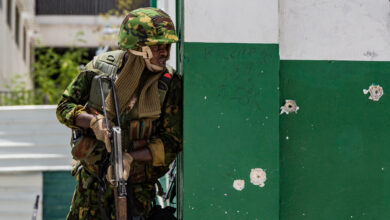Economic uncertainty grows in Argentina due to crisis
Mauricio Macri announced that he would seek to extend the terms of the obligations to relieve pressure on local currency and central bank reserves

Woman holding a tablet showing statistics. / Reference image / Pixabay
Reuters | Gabriel Burin y Eliana Raszewski
Listen to this article
Leer en español: La Incertidumbre económica crece en Argentina por la crisis
The agency Standard & Poor's (S&P) said Thursday that Argentina's decision to "unilaterally" extend the maturities of its debt constitutes a default of payments and warned that the country's credit rating, which is going through a severe crisis, is now in " selective default ".
As a result of the crisis of confidence, due to the political tension caused by the electoral defeat of the ruling party in the primaries, President Mauricio Macri's government said Wednesday that he would seek to extend the terms of the obligations to relieve pressure on the local currency and reserves from the central bank.
The decision, which plans to extend the maturities of private debt and with the International Monetary Fund (IMF) by about 100,000 million dollars, will require agreements with the multilateral agency, Congress and banks.
On Thursday, financial uncertainty continued in Argentina. The country risk index of the investment bank JP Morgan climbed 204 basis points to 2,276 units at 5:05 p.m. local time (2005 GMT), reflecting the greatest concern of investors, in another complicated session for domestic assets.
In the exchange market, on the other hand, the peso closed with a rise of 0.35% after an initial crash and traded at 57.86 / 57.90 units against the dollar. The Buenos Aires Stock Exchange fell 5.7%.
The Minister of Finance, Hernán Lacunza, stressed that the plan aims only to extend the deadlines and does not imply any loss for investors. But the initiative is surrounded by questions, given the experience of other tortuous renegotiations of Argentine debt in the recent past.
"We remain cautious," Citibank said in a report. "While we believe that short-term financing needs have been addressed, political uncertainty remains high."
Argentine assets collapsed after Macri, a liberal with a good image in the markets, suffered a crushing defeat in the primary elections on August 11 before center-left Peronist Alberto Fernández, who investors fear for fear of reinstatement interventionist policies.
The primaries are considered as a crucial test for the continuity of Macri's reforms before the October elections, in which he will seek re-election. Fernandez has promised that he will take the country out of the hard economic problems it is going through, with high inflation and recession.
Read also: Huawei cloud: the first public storage cloud in Chile
Thriller in Congress
The Government initiative exerted more selling pressure on the first European operations on Argentina's dollar bonds issued under foreign law.
According to IHS Markit, the cost of ensuring exposure to the debt of the South American country soared to 4,247 basis points in the five-year credit default swaps market (CDS).
The financial operators were eager to know the next steps of the "reperfilation" of the Argentine debt. In his announcement Wednesday, Minister Lacunza said a bill would be sent to Congress to promote voluntary debt swap under local jurisdiction.
Deputy Eduardo Amadeo, of the ruling party, who was in a meeting at the Ministry of Finance to learn more about the project, told Reuters that Congress would be in charge of deciding the extension of the bond terms under local legislation.
But opposition candidate Fernandez said it is not clear even if Peronism will support the project in Congress, where the ruling party does not have its own majority. "I have no idea (about whether Peronism will support the initiative) because I don't know what they are going to send" to Congress, Fernández told reporters.
The National Securities Commission reported that the prolongation of short-term debt would apply to institutional investors and not to individuals, seeking to relieve the nervousness of the people who bet on those instruments.
However, on Thursday some bank branches in Buenos Aires were filled by customers restless about their savings. A source from a major bank told Reuters that the influx to its branches has increased for days.
Although the central bank sold 1,623 million dollars to the foreign exchange market since the primary of August 11 to contain the demand for the currency, the peso has depreciated 21.71% in that period.
Read also: Bolsonaro weakens Brazil's environmental agency while fires increase
IMF Expectation
On Wednesday night, the IMF said it was in the process of analyzing the announced measures and assessing their impact.
"The new profile (of debt maturities) was already in prices," said Alberto Bernal, chief strategist for emerging markets at XP Investments in New York. "I hope the IMF supports the decision, especially since the IMF is already fully involved here."
"As far as I understand, this transaction does not trigger CDS (default insurance payments), but will force the rating agencies to declare that Argentina is again in selective default," he added.
Selective default occurs when a country does not make payments on a debt obligation but meets other securities.
The phantom of the cessation of payments reappears in Argentina after in 2001 it starred in one of the greatest breaches of history for more than 100,000 million dollars.
Macri ended the last chapter of the 2001 moratorium by agreeing in 2016 to pay more than $ 9 billion to creditors who rejected the debt restructuring of 2005 and 2010.





